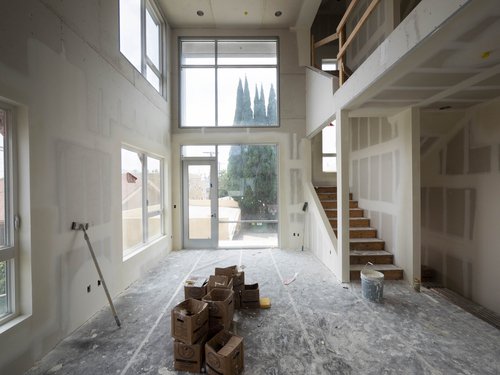What can builders do themselves when building a house?
the essentials in brief
Depending on the expansion stage of your house, there are different ways of doing your own work.
Always draw up a cost-benefit calculation, even if you bring in your own networks and resources.
The construction of your prefabricated house will be more expensive or cheaper, depending on how much work you do yourself. Many builders are therefore wondering which expansion stage they should choose. The first thing to do is to clarify to what extent you want to be involved in the construction of the house yourself.
Do you value professional assessment, speed and precision, or are you passionate and just as thoroughly involved in the creative process? Do you have a network of professionals or hobby painters that you would like to see involved in building the house? Do you show skill at things like carpentry?
Table: Which expansion level suits your skills?
| Expansion stage: Shell construction | Expansion stage: Technically ready | Expansion stage: turnkey |
| If you opt for a shell, there are almost no limits to your creativity. You make yourself responsible for the technology of the house, the drywall and painting work. | A technically ready house requires, among other things, knowledge of attaching sanitary objects and dry construction. | If the house is turnkey in the end, there is little or no creativity Work on the house necessary. |
In our article on expansion stages: turnkey, ready for technology, ready for expansion you will find detailed explanations of the individual terms – and information on the pitfalls of these manufacturer designations.
Tip: Take the time in advance to reconcile your wishes with the expansion stages!
capture resources
In consultations, builders have repeatedly asked us whether it is even legally permissible to involve friends in the construction of a house or whether this would constitute illegal undeclared work. In principle, friendly service by family members, neighbors or acquaintances does not count as undeclared work. You are still within the legal framework even if you agree to a small sum as compensation for the help. However, the work must not be geared towards long-term profit.

While from a legal point of view there is nothing wrong with enlisting the help of friends to build a house, it is important to clarify whether it is worth doing the work yourself. The builder is of course liable for damage caused by work carried out on his own – and in the worst case this can be really expensive. And even if no major damage occurs, the entire construction is often delayed because the period for the internal work was too short. If the contracted construction company cannot start on time, builders have to reckon with high additional costs. It is therefore worthwhile to put together an individual cost-benefit catalog with a view to your network and your own resources before starting construction. The following questions should be clarified here:
- Are there any experts in your circle of acquaintances, for example an electrician, who would make you a good offer?
- For example, do you have painting experience yourself or do you dare to take on smaller manual jobs?
- How much work and what material costs would you face if you did your own work on the house?
- Have you obtained offers from the responsible companies and compared them with the estimated costs for your own work?
Tip: Work based on your own experience can be estimated more reliably than, for example, recommendations in YouTube tutorials.
Danger! Personal contribution also always means personal responsibility: In the event of damage, you are liable yourself!
Craftsmanship and savings potential that can be carried out well for laypeople
Due to the possible risks mentioned above of incorrectly calculated or incorrectly carried out own work, laypeople should rather keep their hands off the installation of electrics, heating and sanitary technology. Work that can be easily carried out by builders with average skill is the laying out of the garden, painting, wallpapering and laying the floor. Builders should schedule around 40 hours of work for the garden, and around €1,800 can be saved here. Approximately 160 hours should be estimated for painting and wallpapering, the savings potential here is €7,500. Approximately 65 hours are required for floors and 100 hours for laying tiles. In the best case, builders save €2,800 or €4,200.
Checklist: personal contributions for laypeople
- painting work
- Laying floors
- Attaching lighting and accessories such as towel rails, door handles and sockets
- Garden and outdoor work
Conclusion
Tip: It is often not worthwhile to acquire various new skills under time pressure.
In any case, to make sure you’re making the most of your money and time, it makes sense to determine potential savings by comparing the cost of materials and labor. In our article Saving construction costs through the right expansion stage , we show where you can save money most easily. In the end, it is crucial to what extent you want to participate in the construction of the house and what is actually worthwhile. As a general rule, you should be aware that your home may be a lifetime investment, both in terms of time and money. Depending on your penchant for perfection or individualism, don’t be afraid to invest time and money!




